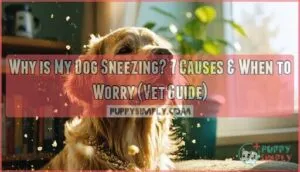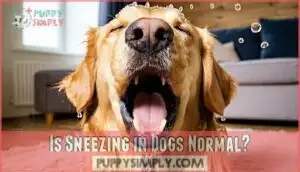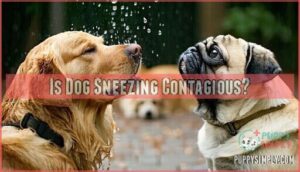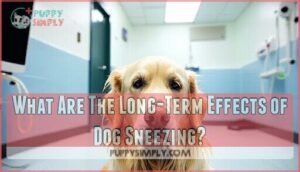This site is supported by our readers. We may earn a commission, at no cost to you, if you purchase through links.

Common triggers include dust, pollen, or something stuck in their nose after exploring outdoors.
Dogs also sneeze during play to show excitement – it’s their way of saying "I’m having fun".
Allergies can cause sneezing too, along with itchy skin or watery eyes.
Reverse sneezing, which sounds like honking, happens when their soft palate gets irritated.
Most sneezing episodes are harmless and clear up quickly.
However, frequent sneezing with blood, thick discharge, or other symptoms needs professional care.
Understanding what’s normal versus concerning can help you decide when your furry friend needs attention.
Table Of Contents
- Key Takeaways
- What Causes Dog Sneezing?
- Is Sneezing in Dogs Normal?
- Can Dogs Get Allergies?
- What Are The Symptoms of Allergies in Dogs?
- Should I Take My Dog to The Vet?
- How Can I Treat Dog Sneezing?
- Is Dog Sneezing Contagious?
- What Are The Long-Term Effects of Dog Sneezing?
- Frequently Asked Questions (FAQs)
- Is it normal for a dog to sneeze a lot?
- Why does my dog sneeze?
- Why does my Rottweiler sneeze?
- Why is my dog sneezing during a playdate?
- Why is my dog sneezing blood?
- Can food allergies cause excessive sneezing in dogs?
- How do you treat a sneezing dog?
- When should I take my dog to the vet for sneezing?
- What are dogs telling you when they sneeze?
- What can I do to prevent my dog from sneezing?
- Conclusion
Key Takeaways
- Your dog’s occasional sneezing is normal and harmless – it’s just their way of clearing dust, pollen, or other irritants from their nose, and they’ll even sneeze during play to show excitement.
- You should watch for warning signs like bloody discharge, thick mucus, frequent daily sneezing, or breathing difficulty – these symptoms mean it’s time for a vet visit right away.
- Common causes include seasonal allergies, airborne irritants like cleaning products, foreign objects stuck in the nose, or reverse sneezing that sounds like honking but is typically harmless.
- You can help prevent sneezing by keeping your home clean, avoiding strong scents and harsh chemicals around your dog, and addressing any underlying allergies with your vet’s guidance.
What Causes Dog Sneezing?
Dog sneezing happens when irritants trigger your pet’s natural reflex to clear their nasal passages, which can range from harmless play behavior to serious health concerns.
You’ll find that causes include everything from seasonal allergies and airborne dust to foreign objects stuck in the nose or underlying infections that need veterinary attention.
Allergies
Just like humans, dogs can develop allergies that trigger frequent sneezing fits.
Environmental allergens such as pollen, dust mites, and mold are common culprits, while food allergies can also cause nasal irritation. Some breeds have a genetic predisposition to developing these sensitivities.
Identifying the cause may require a specific dog product.
- Seasonal allergies often peak during spring and fall when pollen counts soar
- Environmental allergies include household cleaners, perfumes, and cigarette smoke
- Food allergies may develop from proteins in chicken, beef, or dairy products
- Allergy testing helps identify specific triggers for targeted allergy prevention strategies
Play Sneezing
Ever wonder why your dog sneezes during playtime?
Play sneezing serves as social cues, signaling exaggerated playfulness and excitement to other dogs.
This normal dog behavior shows happiness and helps communicate friendly intentions.
Most dogs sneeze once or twice during active play, though breed differences exist.
Flat-faced breeds may sneeze more frequently due to their anatomy, making this normal frequency slightly higher, which can be seen as a display of exaggerated playfulness.
Reverse Sneezing
Reverse sneezing sounds like your dog’s honking or snorting rapidly.
This backward-sneeze happens when dogs inhale forcefully through their nose, often triggered by excitement, allergens, or irritants.
Brachycephalic breeds like pugs face higher risks due to their flat faces.
Most episodes resolve naturally, but gently massaging your dog’s throat can help ease the spasms.
Airborne Irritants
Common household products can turn your dog’s nose into a sneezing machine.
Dust mites, pollen exposure, and chemical irritants from cleaning supplies trigger reactions in sensitive pups.
Smoke inhalation and mold spores also cause problems.
Poor air quality affects your dog’s breathing, making environmental irritants a real concern.
A solution could be a home air purifier to reduce these allergens.
These airborne irritants create ongoing discomfort for many dogs, and using an air purifier can be a key step in addressing this environmental concern.
Foreign Body
Foreign objects like grass seeds or foxtail can lodge deep in your dog’s nose, causing violent sneezing fits.
These sneaky culprits create serious nasal obstruction, often triggering bloody discharge and frantic pawing at the face.
Don’t attempt object removal yourself – you’ll likely push it deeper.
Your vet may need surgical options or specialized tools to safely extract foreign bodies.
Quick veterinary care prevents infection and stops the misery.
Some dogs seem drawn to sniffing everything, making this surprisingly common.
Is Sneezing in Dogs Normal?
Yes, dog sneezing is perfectly normal most of the time. Your pup’s occasional achoo is just their body’s way of clearing out dust, pollen, or other particles from their nose. Think of it as their natural air filter doing its job.
Normal Frequency for healthy dogs includes one or two sneezes daily without concern. Play Sneezing happens when your dog gets excited during games or greetings – it’s actually a happy signal that shows they’re having fun.
Reverse Sneezing sounds scary but it’s usually harmless, involving rapid inhalations that sound like snorting.
However, When to Worry becomes important if sneezing turns frequent, violent, or comes with bloody discharge. Breed Predisposition affects flat-faced dogs like pugs and bulldogs more due to their unique nasal anatomy.
A sneezing puppy or adult showing dog nasal issues beyond occasional sneezes needs attention. Normal canine sneeze patterns shouldn’t disrupt daily activities or include concerning symptoms.
Can Dogs Get Allergies?
Just like you might reach for tissues during pollen season, dogs absolutely can develop allergies that trigger sneezing fits.
Dog allergies affect millions of pets, with seasonal allergies being particularly common during spring and fall.
Certain breeds show breed predisposition to specific allergens, from dust mites to tree pollen. Common allergens include grass, mold, and household chemicals.
Managing allergies often requires allergy testing to pinpoint triggers, helping determine allergy severity. A reliable dog allergy test can help determine specific allergens.
Pet allergies aren’t just uncomfortable—they can worsen without proper care, making early identification essential for your pup’s comfort.
What Are The Symptoms of Allergies in Dogs?
Dog allergies show up in ways that might surprise you.
While dog sneezing gets attention, your pup’s allergic reactions often appear as a package deal of uncomfortable symptoms that affect multiple body systems.
- Skin irritation becomes obvious when your dog constantly scratches, develops red patches, or shows hair loss from excessive grooming
- Digestive issues like diarrhea, vomiting, or gas can signal food allergies working their way through your pet’s system
- Eye discharge creates that telltale watery or thick discharge that makes your dog look perpetually sad
Watch for facial swelling around the muzzle or eyes, which signals a serious allergic reaction.
Paw licking becomes obsessive when dogs try to soothe itchy feet.
Pet allergies aren’t just about sneezing—they’re whole-body responses.
Dog cold symptoms might seem similar, but allergies persist longer and involve more itching than typical respiratory infections.
Should I Take My Dog to The Vet?
Knowing when your dog’s sneezing warrants a vet visit can feel like solving a puzzle.
While occasional sneezing is normal, certain red flags signal it’s time for professional help.
| Urgent Symptoms | Discharge Appearance | Sneezing Frequency |
|---|---|---|
| Bloody nasal discharge | Thick, yellow-green mucus | More than 3-4 times daily |
| Difficulty breathing | Foul-smelling discharge | Continuous sneezing fits |
| Facial swelling | Blood-tinged mucus | Sudden onset sneezing |
| Loss of appetite | Clear but excessive | Violent sneezing episodes |
| Lethargy or fever | One-sided discharge | Sneezing with wheezing |
Puppy sneezing requires immediate attention when accompanied by other symptoms.
Don’t attempt home treatment for severe cases – veterinary advice is essential for proper diagnosis.
Dog allergies and dog cold symptoms can mimic serious conditions, making professional evaluation essential for your pet’s health and your peace of mind.
How Can I Treat Dog Sneezing?
Treatment for your dog’s sneezing depends on the underlying cause, and you’ll need to work with your vet to identify the right approach.
The key to stopping your dog’s sneezing? Finding the root cause, not just masking the symptoms.
While some mild cases respond to simple home care like removing irritants from your dog’s environment, persistent or severe sneezing typically requires professional veterinary treatment and sometimes prescription medications.
Over-the-Counter Remedies
While reaching for home remedies might seem like a quick fix for dog sneezing, proceed with caution. Some over-the-counter options can help manage mild symptoms, but they’re not one-size-fits-all solutions.
Safe options for addressing irritants dog nose issues include:
- Saline nasal rinses – gentle cleaning that removes allergens and debris without harsh chemicals
- Cool-mist humidifiers – add moisture to dry air that might be triggering nasal discharge dog symptoms
- Herbal options like chamomile steam – natural anti-inflammatory properties for mild relief
Antihistamine dosage requires veterinary guidance since human medications aren’t FDA-approved for pets. Benadryl might help allergies at one milligram per pound twice daily, but when avoid giving any medication without professional approval. Remedy risks include drowsiness, hyperactivity, or dangerous interactions with other ingredients like decongestants.
Supporting your dog’s immune system through probiotics offers a gentler approach than jumping straight to medications for ongoing dog sneezing episodes.
Veterinary Care
When your dog’s sneezing becomes frequent or severe, professional veterinary care is your best bet for getting to the root of the problem.
Your vet will start with a thorough veterinary diagnosis, examining your dog’s nose, throat, and breathing patterns.
Diagnostic procedures may include X-rays, nasal scopes, or blood tests to identify infections, foreign objects, or tumors.
Treatment options vary depending on the cause.
Bacterial infections need antibiotics, while allergies require antihistamines or steroids.
Foreign bodies must be removed surgically.
Emergency signs like bloody discharge, difficulty breathing, or facial swelling demand immediate emergency veterinary care.
Post-treatment care often involves monitoring symptoms and following medication schedules.
Your veterinary consultation will include preventative measures like regular dental cleanings and allergen management.
Don’t hesitate to seek veterinary treatment early—catching problems before they worsen saves both money and your dog’s comfort.
Professional dog veterinary care guarantees accurate diagnosis and effective solutions.
Is Dog Sneezing Contagious?
Most dog sneezing isn’t contagious to humans, but dog-to-dog spread can happen with certain conditions.
While zoonotic potential remains low for typical sneezing, some upper respiratory infections like kennel cough and dog flu spread easily between dogs through airborne droplets.
The contagion timeline varies, with infected dogs potentially spreading illness for weeks. Breed susceptibility doesn’t substantially affect transmission rates.
Watch for these warning signs of contagious conditions:
- Sneezing with thick, colored nasal discharge
- Fever and lethargy accompanying respiratory symptoms
- Multiple dogs showing similar symptoms
- Recent exposure to crowded dog areas
What Are The Long-Term Effects of Dog Sneezing?
Most dog sneezing episodes resolve without lasting problems, but persistent cases can create ripple effects throughout your pet’s health.
Chronic rhinitis develops when constant inflammation damages delicate nasal tissues, leading to ongoing congestion and discomfort.
Over time, this nasal damage can reduce your dog’s ability to smell properly, affecting their appetite and enjoyment of food.
Secondary infections become more likely when irritated nasal passages provide breeding grounds for bacteria and fungi.
These complications often require extended antibiotic treatments and multiple vet visits.
Dogs experiencing chronic nasal discharge may develop behavioral changes, becoming less active or social due to constant discomfort.
Your dog’s quality of life can suffer substantially when sneezing becomes a daily struggle.
Simple pleasures like playing fetch or exploring new scents become less enjoyable.
Early intervention prevents these cascading dog health concerns, protecting both your pet’s physical comfort and emotional wellbeing.
Frequently Asked Questions (FAQs)
Is it normal for a dog to sneeze a lot?
Bella’s owner panicked when she sneezed fifteen times during their morning walk.
Occasional sneezing is perfectly normal for dogs, but if your pup sneezes more than 3-4 times daily with discharge, contact your vet immediately.
Why does my dog sneeze?
Your dog’s sneezing stems from various causes: irritants like dust or pollen, allergies, infections, foreign objects in nasal passages, or excitement during play. Most occasional sneezing is normal behavior.
Why does my Rottweiler sneeze?
Like a canary in a coal mine signaling danger, your Rottweiler’s sneezing alerts you to potential issues.
It’s usually normal—clearing dust or pollen—but frequent sneezing with discharge needs veterinary attention immediately.
Why is my dog sneezing during a playdate?
Playdate sneezing is totally normal.
Your pup’s excitement triggers happy sneezes during fun activities.
It’s their way of clearing nasal passages while playing.
Unless there’s discharge or distress, those joyful snorts show they’re having a blast.
Why is my dog sneezing blood?
Blood in your dog’s sneezes signals serious trouble. Nasal infections, foreign objects, tumors, or injuries cause this alarming symptom. Don’t wait—visit your vet immediately for proper diagnosis and treatment.
Can food allergies cause excessive sneezing in dogs?
Food allergies rarely cause excessive sneezing in dogs.
You’re more likely dealing with environmental allergens like pollen or dust.
Food allergies typically trigger digestive issues, skin problems, and itching rather than respiratory symptoms.
How do you treat a sneezing dog?
Treatment varies wildly depending on the cause, so first identify what’s triggering your dog’s sneezing.
You’ll need a vet visit for proper diagnosis, then follow their prescribed medication, environmental changes, or removal procedures to address the identified cause, which may involve specific treatment.
When should I take my dog to the vet for sneezing?
You should take your dog to the vet if sneezing occurs with bloody discharge, thick mucus, breathing difficulty, facial swelling, lethargy, fever, or if it’s frequent and persistent daily.
What are dogs telling you when they sneeze?
Your furry friend’s gentle achoos aren’t always distress signals.
Dogs sneeze to clear irritants, show playfulness during games, express excitement, or signal allergies.
It’s their natural way of communicating comfort or mild discomfort.
What can I do to prevent my dog from sneezing?
Keep your home clean by regularly vacuuming and dusting.
Avoid strong scents, smoke, and harsh chemicals around your dog.
Maintain good dental hygiene and address allergies promptly to reduce sneezing triggers.
Conclusion
Like pieces of a puzzle falling into place, understanding why your dog is sneezing helps you respond appropriately.
Most sneezing episodes are harmless reactions to dust, pollen, or playful excitement. However, persistent sneezing with blood or thick discharge requires veterinary attention.
Monitor your dog’s symptoms and trust your instincts. Simple irritants usually resolve quickly, while serious conditions need professional care.
When in doubt about why is my dog sneezing, consult your veterinarian for proper diagnosis and treatment.
- https://www.ncbi.nlm.nih.gov/pmc/articles/PMC2147700/
- https://ndsr.co.uk/specialist-referral-service/pet-health-information/soft-tissue-surgery/aspergillosis-fungal-rhinitis
- http://petcancercenter.org/Cancer_Types_nasal_cavity_dogs.html
- https://booking.thevets.com/
- https://www.merckvetmanual.com/digestive-system/dentistry-in-small-animals/endodontic-disease-in-small-animals











